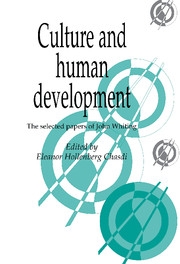Book contents
- Frontmatter
- Contents
- List of figures
- Preface
- Acknowledgments
- Introduction: John Whiting and anthropology
- Fifty years as a behavioral scientist: autobiographical notes
- Part I Theory and methods
- Introduction
- 1 Contributions of anthropology to the methods of studying child rearing
- 2 The cross-cultural method
- 3 A model for psychocultural research
- Part II Environment and history
- Part III Moral development
- Part IV Gender development
- Part V Development of social behavior
- Bibliography
- Complete bibliography of John W. M. Whiting's work
- Index
Introduction
Published online by Cambridge University Press: 23 December 2009
- Frontmatter
- Contents
- List of figures
- Preface
- Acknowledgments
- Introduction: John Whiting and anthropology
- Fifty years as a behavioral scientist: autobiographical notes
- Part I Theory and methods
- Introduction
- 1 Contributions of anthropology to the methods of studying child rearing
- 2 The cross-cultural method
- 3 A model for psychocultural research
- Part II Environment and history
- Part III Moral development
- Part IV Gender development
- Part V Development of social behavior
- Bibliography
- Complete bibliography of John W. M. Whiting's work
- Index
Summary
This part, theory and methods, contains three selections which introduce the reader to the basic concepts of culture and custom, the need for cross-cultural research, a model for conceptualizing psychocultural research, and the methodological issues involved in selecting appropriate samples and obtaining and analyzing individual and cultural data. Theoretical and methodological concerns, however, are not confined to this section. They are echoed throughout the anthology, and are considered in detail in the specific context of subsequent articles.
The first selection, “Contributions of anthropology to the methods of studying child rearing,” presents a clear and explicit analysis of the basic concept of culture. The authors view culture as essentially symbolic, and state that it “provides a cognitive map or blueprint, which governs the action of the members of every society.” The cognitive system of culture is discussed in terms of its units – individual customs – and three aspects of customs are distinguished: techniques, beliefs, and values. A technique is a recipe for action, a belief is a statement assuming a relationship between events, and a value attributes goodness or badness to any event. Techniques, beliefs, and values, which are associated with customary ways of acting, thinking, and feeling, are buttressed by rationalizations and justifications, and are systematically related to one another in a constellation defined as a custom complex. Custom complexes, in turn, are organized into larger systems of roles and institutions, thus providing additional forces for cultural integration and a sense of common purpose among the individual members of a given society.
- Type
- Chapter
- Information
- Culture and Human DevelopmentThe Selected Papers of John Whiting, pp. 45 - 47Publisher: Cambridge University PressPrint publication year: 1993



